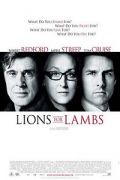
Directed by
Robert Redford
92 minutes
Rated M
Reviewed by
Bruce Paterson

Lions For Lambs
Synopsis: three connected stories - essentially three conversations - questioning life, death, politics, media and war.“Ich habe noch nie solchen lowen gesehen die solche lamer gefuhrt werden.”
(“Nowhere have I seen such Lions led by such Lambs.”)
General Max von Gallwitz, Supreme German Commander, 1916
Lions for Lambs is an impassioned plea to ‘engage’ with the issues and the world from whatever may be your political perspective of choice, a challenge to think more than a particularly cinematic experience. Three stories challenge the viewer to analyse what may be easier or more comfortable to ignore. One has the lecturer (Robert Redford) trying to motivate his bright but disillusioned student (Andrew Garfield). Another sees the journalist (Meryl Streep) invited by the up-and-coming Senator (Tom Cruise) to hear his exclusive story on an incisive new strategy in Afghanistan. The third sees two of the lecturer’s former students (Michael Pena and Derek Luke), now soldiers, coming under fire on the front line of this ‘strategy’. These stories could be simply summarised as the emotional challenge, the intellectual challenge, and the physical call to action (whether military or civil).
Passion must surely have been a driving force for bringing this film into being: for Redford to choose the script from one of many Iraq/Afghanistan war screenplays; for Streep to pour herself into the role of a formerly clear-eyed journalist now realizing she has succumbed to the comfortable pay cheque from a media corporation that’s happy to float the Government’s PR; for Cruise to choose this as his first film since taking up leadership of United Artists.
Yet the real passion lies somewhere outside the film itself, in the political and cultural environment that has made it necessary for stories like this to be told. America has the capacity to intervene single-handedly in another country’s fate yet will or can its citizens accept their collective responsibility for doing so? Or will their modern-day lamb keep sending his lions to slaughter? And although unspoken in the film, will we - her reluctant allies - do our part to hold him to account?
These ideas hold more interest than the film itself which is too simply staged and somewhat inconsistently performed to be effective on the big screen. Set almost entirely in the lecturer’s office, the Senator’s suite, the snowy film-set (I mean, Afghan mountains), it lacks a visual edge. The dialogue is also pretty straight down the line. The performances that stand out are those of Streep, uncomfortable with her changing profession and her age; and Pena and Luke who give up everything for a principle, a decision which ends with a forgiveable touch of sentimentality.
Nevertheless Lions for Lambs remains a strong clarion call, not necessarily teaching something new, but a reminder of longer-lived, uncomfortable truths.
“I am never afraid of an army of Lions led into battle by a Lamb. I fear more the army of Lambs who have a Lion to lead them.”

Want more about this film?


Want something different?




